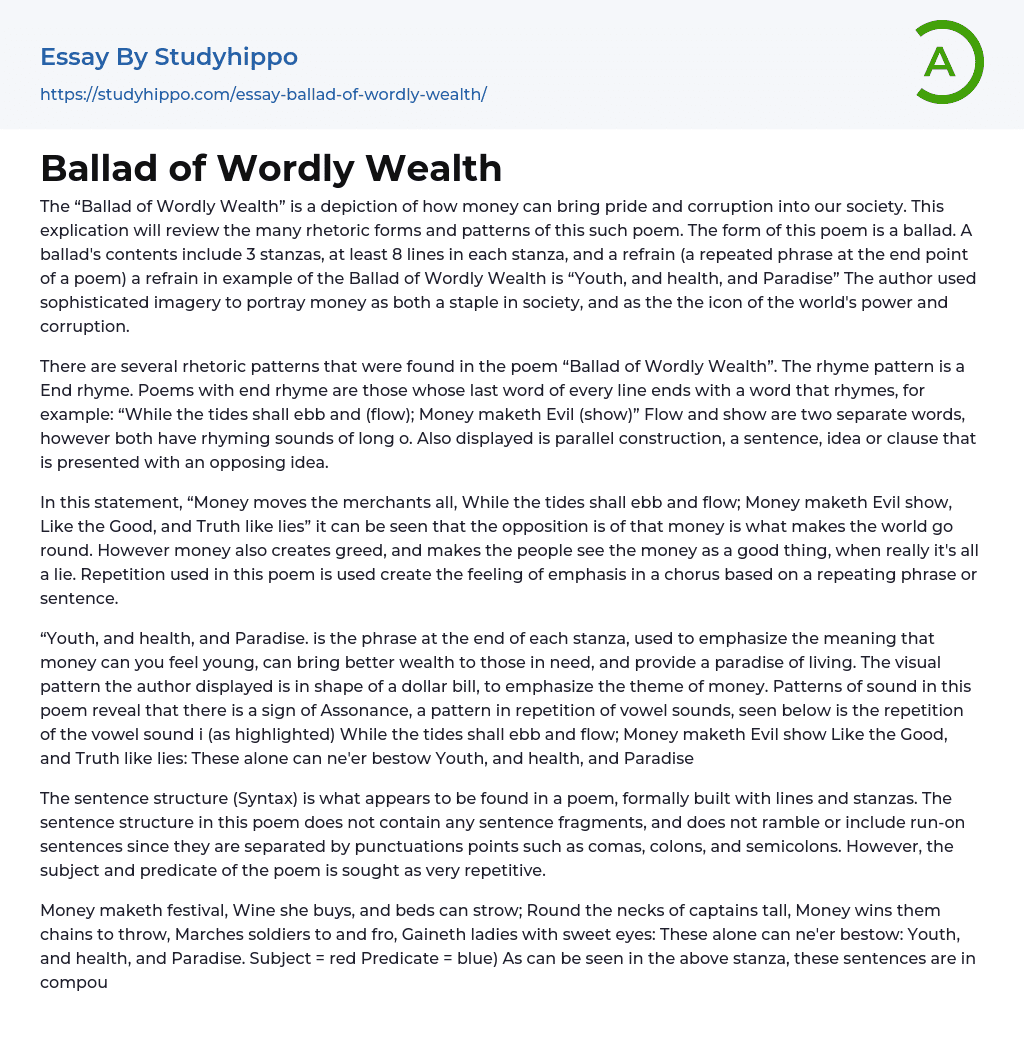The “Ballad of Wordly Wealth” is a depiction of how money can bring pride and corruption into our society. This explication will review the many rhetoric forms and patterns of this such poem. The form of this poem is a ballad. A ballad's contents include 3 stanzas, at least 8 lines in each stanza, and a refrain (a repeated phrase at the end point of a poem) a refrain in example of the Ballad of Wordly Wealth is “Youth, and health, and Paradise” The author used sophisticated imagery to portray money as both a staple in society, and as the the icon of the world's power and corruption.
There are several rhetoric patterns that were found in the poem “Ballad of Wordly Wealth”. The rhyme pattern is a End rhyme. Poems with e
...nd rhyme are those whose last word of every line ends with a word that rhymes, for example: “While the tides shall ebb and (flow); Money maketh Evil (show)” Flow and show are two separate words, however both have rhyming sounds of long o. Also displayed is parallel construction, a sentence, idea or clause that is presented with an opposing idea.
In this statement, “Money moves the merchants all, While the tides shall ebb and flow; Money maketh Evil show, Like the Good, and Truth like lies” it can be seen that the opposition is of that money is what makes the world go round. However money also creates greed, and makes the people see the money as a good thing, when really it's all a lie. Repetition used in this poem is used create the feeling of emphasis
in a chorus based on a repeating phrase or sentence.
“Youth, and health, and Paradise. is the phrase at the end of each stanza, used to emphasize the meaning that money can you feel young, can bring better wealth to those in need, and provide a paradise of living. The visual pattern the author displayed is in shape of a dollar bill, to emphasize the theme of money. Patterns of sound in this poem reveal that there is a sign of Assonance, a pattern in repetition of vowel sounds, seen below is the repetition of the vowel sound i (as highlighted) While the tides shall ebb and flow; Money maketh Evil show Like the Good, and Truth like lies: These alone can ne'er bestow Youth, and health, and Paradise
The sentence structure (Syntax) is what appears to be found in a poem, formally built with lines and stanzas. The sentence structure in this poem does not contain any sentence fragments, and does not ramble or include run-on sentences since they are separated by punctuations points such as comas, colons, and semicolons. However, the subject and predicate of the poem is sought as very repetitive.
Money maketh festival, Wine she buys, and beds can strow; Round the necks of captains tall, Money wins them chains to throw, Marches soldiers to and fro, Gaineth ladies with sweet eyes: These alone can ne'er bestow: Youth, and health, and Paradise. Subject = red Predicate = blue) As can be seen in the above stanza, these sentences are in compound form, the subject of Money is repeated throughout the first two lines of the stanza, making it
clear that it is the main subject of the poem. The author uses vocabulary referring to the Old English, using unfamiliar words such as: Ebb, Ne'er, mitres, Abbeys, gaineth, maketh, strow, and penitence. Some of these words that I tried to define were categorized Archaic, since these words are no longer used in modern poetry.
- Boo Radley essays
- Genesis essays
- Richard iii essays
- Alice in Wonderland essays
- On the road essays
- Ozymandias essays
- The Nightingale essays
- Holden Caulfield essays
- Animal Farm essays
- 1984 essays
- A Hanging essays
- Shooting An Elephant essays
- A Tale Of Two Cities essays
- Adventures Of Huckleberry Finn essays
- Arthur Conan Doyle essays
- Brave New World essays
- Characters In Hamlet essays
- Characters In Romeo And Juliet essays
- Desdemona essays
- Diary Of A Wimpy Kid essays
- First-Person Narrative essays
- Frankenstein essays
- Heart Of Darkness essays
- Jane Eyre essays
- Jay Gatsby essays
- King Duncan essays
- Librarian essays
- Little Red Riding Hood essays
- Lord Of The Flies essays
- Silas Marner essays
- The Cask Of Amontillado essays
- The Catcher In The Rye essays
- The Crucible essays
- The Handmaid's Tale essays
- The Reader essays
- Virgil essays
- Wuthering Heights essays
- Candide essays
- Castle essays
- J. D. Salinger essays
- Ulysses essays
- Ethan Frome essays
- In Cold Blood essays
- Outliers essays
- Tuesdays With Morrie essays
- The Art of War essays
- Wife of Bath essays
- Huckleberry Finn essays
- The Lady With The Dog essays
- Great Expectations essays




